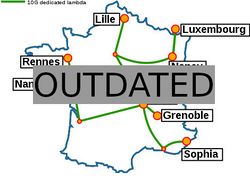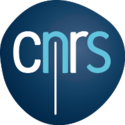Grid5000:Home: Difference between revisions
No edit summary |
No edit summary |
||
| Line 7: | Line 7: | ||
Key features: | Key features: | ||
* provides '''access to a large amount of resources''': | * provides '''access to a large amount of resources''': 15000 cores, 800 compute-nodes grouped in homogeneous clusters, and featuring various technologies: GPU, SSD, NVMe, 10G and 25G Ethernet, Infiniband, Omni-Path | ||
* '''highly reconfigurable and controllable''': researchers can experiment with a fully customized software stack thanks to bare-metal deployment features, and can isolate their experiment at the networking layer | * '''highly reconfigurable and controllable''': researchers can experiment with a fully customized software stack thanks to bare-metal deployment features, and can isolate their experiment at the networking layer | ||
* '''advanced monitoring and measurement features for traces collection of networking and power consumption''', providing a deep understanding of experiments | * '''advanced monitoring and measurement features for traces collection of networking and power consumption''', providing a deep understanding of experiments | ||
Revision as of 20:53, 19 January 2020
|
Grid'5000 is a large-scale and flexible testbed for experiment-driven research in all areas of computer science, with a focus on parallel and distributed computing including Cloud, HPC and Big Data and AI. Key features:
Grid'5000 is merging with FIT to build the SILECS Infrastructure for Large-scale Experimental Computer Science. Read an Introduction to SILECS (April 2018)
Older documents:
|
Random pick of publications
Five random publications that benefited from Grid'5000 (at least 2937 overall):
- François Portier, Lionel Truquet, Ikko Yamane. Nearest Neighbor Sampling for Covariate Shift Adaptation. 2024. hal-04645530 view on HAL pdf
- Gustavo Salazar-Gomez, Wenqian Liu, Manuel Alejandro Diaz-Zapata, David Sierra González, Christian Laugier. TLCFuse: Temporal Multi-Modality Fusion Towards Occlusion-Aware Semantic Segmentation. IV 2024 - 35th IEEE Intelligent Vehicles Symposium, Jun 2024, Jeju Island, South Korea. pp.2110-2116, 10.1109/IV55156.2024.10588460. hal-04717193 view on HAL pdf
- Dorian Goepp, Samuel Brun, Quentin Guilloteau, Olivier Richard. Un prototype de cache de métadonnées pour le passage à l'échelle de NixOS-Compose. COMPAS 2024 - Conférence francophone d'informatique en Parallélisme, Architecture et Système, Jul 2024, Nantes, France. pp.1-8. hal-04632952 view on HAL pdf
- Houssam Elbouanani, Chadi Barakat, Walid Dabbous, Thierry Turletti. Fidelity-aware Large-scale Distributed Network Emulation. Computer Networks, 2024, 10.1016/j.comnet.2024.110531. hal-04591699 view on HAL pdf
- Adrien Berthelot, Eddy Caron, Mathilde Jay, Laurent Lefèvre. Estimating the environmental impact of Generative-AI services using an LCA-based methodology. CIRP LCE 2024 - 31st Conference on Life Cycle Engineering, Jun 2024, Turin, Italy. pp.1-10. hal-04346102v2 view on HAL pdf
Latest news
Failed to load RSS feed from https://www.grid5000.fr/mediawiki/index.php?title=News&action=feed&feed=atom: Error parsing XML for RSS
Grid'5000 sites
Current funding
As from June 2008, Inria is the main contributor to Grid'5000 funding.
INRIA |
CNRS |
UniversitiesUniversité Grenoble Alpes, Grenoble INP |
Regional councilsAquitaine |


